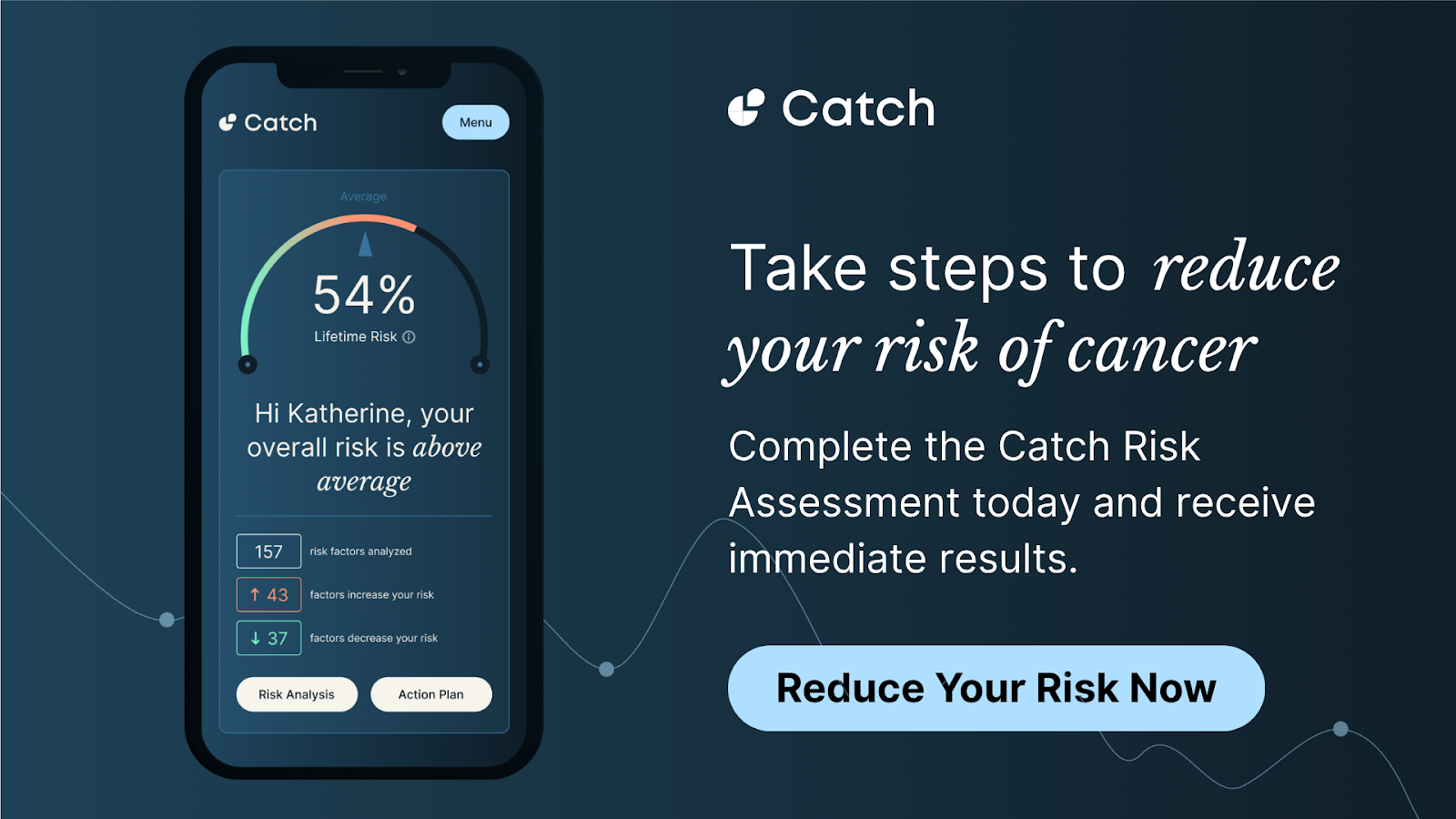Key Takeaways:
- Obesity is linked to at least 13 types of cancer. These include but are not limited to breast, colorectal, and esophageal cancer.
- Many factors can contribute to your cancer risk. Lack of physical activity, poor diet, inflammation, and hormonal imbalances are examples of the mechanisms involved.
- Lowering your cancer risk is possible. Lifestyle choices like regular physical activity, a diet rich in fruits, vegetables, and whole grains, and getting screened on time make a difference in cancer prevention.
Numerous factors can influence your risk of developing cancer. Smoking, drinking, family history, gender, and weight, for example, can all play a role in how likely you are to develop various types of cancer and other medical conditions. If you’ve heard about the link between obesity and cancer, it makes sense that you are concerned. Being informed about your risk status and how to protect your health matters. That’s where we come in.
At Catch, our mission is simple but important. Catch is committed to providing factual insights on cancer prevention and early detection. We’re here to help you learn about your cancer risk, figure out your ideal screening schedule, and arm yourself with strategies to lower your odds of facing the disease.

How Excess Weight Influences Cancer Risk
According to the American Cancer Society, about 5% of cancers in men and 11% of cancers in women are linked to excess body weight. For some cancer types, the risk increase is more notable than it is for others. Excess body weight is a risk factor for multiple types of cancer.
The 13 cancers associated with obesity include:
- Breast cancer (in post-menopausal women).
- Colon and rectal cancer (colorectal cancer).
- Endometrial cancer.
- Esophageal cancer.
- Gallbladder cancer.
- Kidney cancer.
- Liver cancer.
- Ovarian cancer.
- Pancreatic cancer.
- Stomach cancer.
- Thyroid cancer.
- Multiple myeloma (a type of blood cancer).
- Meningioma.
It is essential to recognize that while obesity significantly elevates one's risk of developing cancer, the biology of cancer is complex. Like body size itself, cancer risk is influenced by an interplay of diverse protective factors and risk factors. No matter who you are, there’s something you can do to aid cancer prevention.
Why Does Obesity Cause Cancer?
Even though we know that the connection between obesity and cancer is there, it is not yet fully understood. Here are some possible culprits:
- Blood vessel and cell growth.
- Inflammation levels in the body.
- Levels of certain hormones, such as insulin and estrogen.
- Other factors regulating cell growth (e.g., insulin-like growth factor-1).
- The ability of cancer cells to spread (metastasize).
- The survival or life span of cells.
Note that some of these might affect certain cancer types, as opposed to affecting your risk of all types of cancer.
Navigating Weight Stigma And Cancer Screenings
We can’t talk about cancer prevention without discussing cancer screenings. While the link between cancer risk and weight is multi-faceted, many people do not get the cancer screening services they need due to concerns like weight bias from medical providers. This is a well-established fact, supported by research highlighting the need for enhanced education and awareness among cancer screening professionals.
Many people in overweight or obese BMI categories report feeling stigmatized or dismissed by healthcare professionals, which can impact willingness to get screened. It’s a vicious cycle: delayed screenings mean later detection, and later detection often means worse outcomes. Additionally, some people encounter issues where medical providers brush off symptoms, like unexplained weight loss, that could indicate cancer.
As for what you can do, make sure that you stay on top of your cancer screenings. Follow cancer screening guidelines based on age and other relevant factors, such as family history. Remember: some cancer screenings should begin in your 20s, and youth is not a guaranteed shield. And, if you face these challenges, know you’re not alone. Systemic issues and biases can be challenging, but advocating for yourself is crucial to receiving the care you deserve.

Lifestyle Changes For Cancer Prevention
Learning how to prevent cancer involves a multi-faceted approach. Lifestyle factors play a substantial role in cancer prevention. A higher weight does not necessarily indicate an unhealthy lifestyle, but taking these measures, if you have not already, is strongly recommended.
Physical Activity And Cancer Prevention
Regular physical activity can lower your risk of developing multiple types of cancer, including obesity-related cancers, like breast, colon, and endometrial. Why? Exercise helps regulate hormones like insulin and estrogen, which, when out of whack, can fuel tumor growth. Additionally, physical activity can help reduce inflammation in the body. It can also help you de-stress, which may be preventative in and of itself.
As for how much physical activity is necessary to reduce your cancer risk, you don’t need to be a gym rat to see the benefits. The American Cancer Society recommends at least 150-300 minutes of moderate-intensity activity, like brisk walking, or 75 to 150 minutes of vigorous exercise, like running, per week. Getting to or exceeding the 300-minute mark is considered ideal.
What if you’re just starting out? Even small bursts of movement can shift the odds in your favor. Studies show that sedentary lifestyles, on the other hand, can increase your risk of various cancers and other health issues.
The Importance Of Diet And Nutrition
What you eat plays a role in cancer prevention, regardless of body weight, shape, or size. Here are some tips for building a solid cancer prevention diet:
- Opt for Whole Foods: Choose fresh fruits and vegetables, whole grains, and legumes, which provide essential nutrients and fiber that can help guard against cancer.
- Limit Red and Processed Meats: Consuming large amounts of red meat and processed meats, such as bacon and sausages, can increase the risk of certain types of cancer. Aim to limit intake and consider leaner protein sources such as poultry, fish, and plant-based proteins.
- Incorporate Healthy Fats: Swap saturated and trans fats for healthier fats found in olive oil, avocados, nuts, and fatty fish like salmon, which are high in omega-3 fatty acids.
- Cut Down on Sugar and Refined Carbohydrates: For overall health, reduce your consumption of sugary snacks, beverages, and white bread or pasta in favor of whole, unprocessed alternatives.
- Boost Antioxidant Intake: Antioxidants help fight free radicals in the body. Incorporate a colorful variety of fruits and vegetables, such as berries, leafy greens, and bell peppers.
- Stay Hydrated: Drink plenty of water throughout the day. Adequate hydration is crucial for all bodily functions, and some research suggests a connection between water drinking habits and cancer risk.
- Limit Alcohol Consumption: Alcohol is a known carcinogen. In 2019, alcohol consumption was responsible for around 5% of all cancer diagnoses in the United States. It’s advisable to drink in moderation or not at all.
- Cook at Home More Often: Preparing meals at home allows you to control the ingredients and avoid the hidden sugars, fats, and salts often found in restaurant or convenience foods.
- Choose Fiber-Rich Foods: Dietary fiber, found in whole grains, fruits, and vegetables, can significantly reduce the risk of colorectal cancer and aid in weight management.
These changes do not guarantee cancer prevention. However, they are part of a proactive strategy to lead a healthier life.
Take Control Of Your Health With Catch
At Catch, we hand you the tools to understand your cancer risk and take actionable steps toward prevention. We’re not here to lecture or fearmonger. Our goal is to provide you with the hard data you need to manage your health effectively. Here’s how Catch can support you:
- Know Your Risk: Gain personalized insights about how factors like weight impact your cancer risk for 21 major cancer types.
- Stay Ahead: Get the details regarding your ideal cancer screening schedule. That way, you can stay ahead of the game and catch cancer before it progresses.
- Prevent and Protect: Learn practical strategies to manage your health and lower your risk. As time goes on, you will get to watch your cancer risk go down in real time.
Why wait for the warning signs when you can act now? Join the Catch community to learn more about your risk and build a healthier future today. We’ve got your back, every step of the way.

Final Thoughts
There is a connection between obesity and cancer, and more than one factor plays into it. The good news is that you can work to reduce your cancer risk. At Catch, we’re all about arming you with the knowledge to prevent cancer and catch it early if it does strike.
Focusing on sustainable changes, such as improving nutrition, increasing physical activity, and participating in recommended cancer screenings, can help lower your cancer risk and aid in early detection. Our mission at Catch is to guide you through assessing your cancer risk and help you make adjustments that support your health and well-being.
Take the first step and become a Catch member for just $5/month. For each membership bought, we provide a free one to someone in need.
Read also:
Frequently Asked Questions About Obesity and Cancer
How does obesity cause cancer?
Multiple mechanisms may be involved in the link between obesity and cancer, and more research is needed to understand it fully. Things like increased rates of certain diseases, impact on hormone levels, inflammation, and weight stigma may influence cancer risk and detection.
How much does obesity contribute to cancer mortality?
Excess body weight is linked to about 7% of cancer deaths, according to the American Cancer Society. Factors such as overall health and the stage at which cancer is detected can influence cancer mortality, so staying on top of your well-being is vital.
What are the screening recommendations for individuals who are obese?
Cancer screening guidelines vary by individual risk factors, so personalization is crucial. Discuss cancer screening guidelines with your healthcare providers for individualized guidance. Make sure that you tell your doctor about any additional risk factors you might have, such as a family history of cancer.
What are the most common obesity-related cancers?
Post-menopausal breast cancer is the most common obesity related cancer among women, and colorectal cancer is the most common obesity-associated cancer among men. It is essential to note that the data for obesity-associated cancers are based only on cancer type; they do not estimate the proportion of cancers “caused” by body size.
Does reducing sugar intake affect the risk of obesity-related cancer?
Reducing your sugar intake may lead to weight loss, and some studies suggest that there is a connection between cancer and sugar consumption. Being mindful of your sugar intake is essential for overall health. While it might not protect you from cancer entirely, it is strongly recommended and does not hurt.
What is an obese BMI?
Currently, a BMI (body mass index) of 30 or higher is considered obese for adults. There are different classes of obesity, which may impact your risk of some health concerns, including those related to cancer.
Sources:
- American Cancer Society. (n.d.). Excess Body Weight and Cancer Risk. https://www.cancer.org/cancer/risk-prevention/diet-physical-activity/body-weight-and-cancer-risk.html
- Graham, Y., Hayes, C., Cox, J., Mahawar, K., Fox, A., & Yemm, H. (2022, April 27). A systematic review of obesity as a barrier to accessing cancer screening services. Obesity science & practice. https://pmc.ncbi.nlm.nih.gov/articles/PMC9722456/
- American Cancer Society. (n.d.). Cancer Screening Guidelines. https://www.cancer.org/cancer/screening/american-cancer-society-guidelines-for-the-early-detection-of-cancer.html
- Keren, Y., Magnezi, R., Carmon, M., & Amitai, Y. (2020, October 21). Investigation of the association between drinking water habits and the occurrence of women breast cancer. International journal of environmental research and public health. https://pmc.ncbi.nlm.nih.gov/articles/PMC7589878/
- National Cancer Institute. (n.d.). Alcohol and Cancer Risk. https://www.cancer.gov/about-cancer/causes-prevention/risk/alcohol/alcohol-fact-sheet
- American Cancer Society. (n.d.( American Cancer Society Guideline for Diet and Physical Activity. https://www.cancer.org/cancer/risk-prevention/diet-physical-activity/acs-guidelines-nutrition-physical-activity-cancer-prevention/guidelines.html
- Centers for Disease Control and Prevention. (2025, June 11). Obesity and Cancer. https://www.cdc.gov/cancer/risk-factors/obesity.html
- Centers for Disease Control and Prevention. (2024, March 19). Adult BMI Categories. https://www.cdc.gov/bmi/adult-calculator/bmi-categories.html







.svg)



